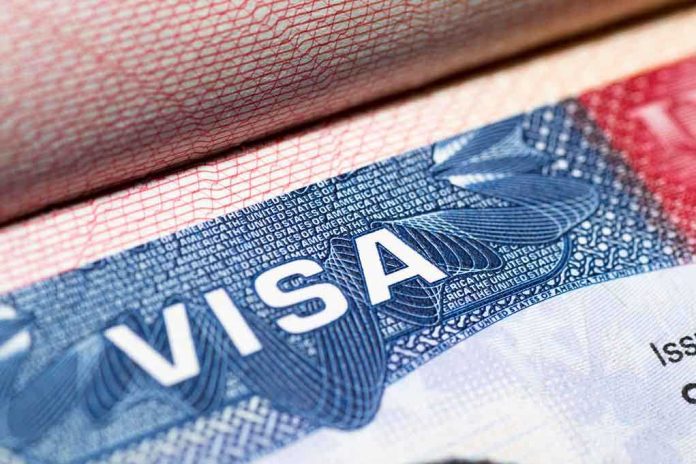
Imagine a world where a soccer ticket can get you through U.S. immigration faster than a business visa, transforming the chaos of global travel into a high-stakes experiment in security, diplomacy, and American hospitality.
Story Snapshot
- Trump’s ‘FIFA Pass’ visa system will let millions of 2026 World Cup fans skip the usual U.S. visa lines—but not the vetting.
- The U.S. government promises standard security measures, but puts host cities on notice: keep events safe or risk losing them.
- Diplomatic tensions with Canada and Mexico cast a shadow over this unprecedented travel policy.
- The move could reset the global playbook for mega-event tourism and U.S. immigration.
Trump’s FIFA Pass: Fast-Tracked Entry for the World’s Biggest Fans
President Donald Trump’s ‘FIFA Pass’ announcement on November 17, 2025, upended decades of rigid U.S. visa practice by offering a fast lane to millions of foreign soccer fans. For the first time, a ticket to a sporting event—not a business meeting, not a family emergency—will earn visitors a spot at the front of the U.S. consular line. The promise: every World Cup ticket holder gets prioritized for a visa interview, as long as standard vetting is satisfied.
Trump’s justification is blunt. “Safety and security is the number one priority,” he declares, but he’s betting that streamlined interviews for verified fans will not compromise vetting. No changes to background checks or entry criteria—just a new algorithm for scheduling who gets seen first. The system is engineered to maximize the economic windfall of the world’s largest sporting event while projecting American efficiency and hospitality to an audience of billions.
Political Chess: Security, Host City Showdowns, and International Tensions
The ‘FIFA Pass’ is more than a customer service innovation; it’s a diplomatic and political gambit. Trump warns host cities like Seattle that any hint of disorder could cost them the games. The message: local officials must deliver ironclad security or lose the global spotlight and revenue. At the same time, a simmering trade dispute with co-hosts Canada and Mexico adds a layer of unpredictability to the World Cup’s three-nation partnership, with U.S. unilateralism on visas fueling quiet grumbling north and south of the border.
Behind the scenes, the State Department and FIFA are scrambling to build a seamless verification and scheduling system. Each visa applicant must prove ticket ownership, clear the usual security checks, and accept the possibility that a single urban protest or spike in crime could reroute the games overnight. The stakes for host cities are enormous: not just the loss of tourism dollars, but the reputational blow of being dropped from the world’s most watched event.
Precedent and Policy: America’s Uncharted Visa Experiment
No previous U.S. sporting event has prompted a policy this sweeping. Past Olympics in other countries have seen temporary waivers or expedited entries, but never a formal, ticket-linked U.S. system. The FIFA Pass sets a precedent that could ripple through future Olympics, Super Bowls, and tech conventions, rewriting the rules for who gets to enter America and how fast. Immigration experts note the vetting standards remain; only the interview line changes.
The context is crucial: America’s post-9/11 visa regime is famously tough, and the debate over immigration—legal and otherwise—remains at fever pitch. Trump’s move is calculated to generate goodwill (and revenue) without ceding an inch on security. Yet, as with any experiment at this scale, implementation risks abound: verifying millions of tickets, coordinating with FIFA, and assuring the public that no shortcuts endanger national safety.
Winners, Losers, and What Comes Next
International soccer fans are the clear short-term winners, gaining a rare edge in the U.S. visa lottery. American businesses and host city economies are set for a windfall if the process works. Local leaders, however, are under unprecedented pressure to prove their cities are safe—Trump has already threatened to strip matches from any city that falls short, a move that would have been unthinkable in previous tournaments.
Diplomatic fallout is an open question. Canada and Mexico, already at odds with Washington over trade, may bristle at a U.S.-centric solution. Critics warn of potential inequities for fans from countries with poor U.S. relations, while supporters hail the move as common-sense prioritization. Some experts see the FIFA Pass as a test run for broader event-linked visa reform, a possible template for the next era of global travel—and a litmus test for how America balances security with openness on the world stage.
Sources:
Politico: Trump to prioritize visas for World Cup ticket holders




